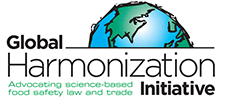
Food Safety Training and Education Working Group
Food Safety Training and Education Working Group
Chair

Prof. Dr. Adewale Olusegun Obadina
Nigeria
Vice-Chair

Prof. Dr. Amalia Mitelut
Romania
Download
- Rapid removal of Linamarin (cause of the disease "Konzo") in Cassava

Cassava is a versatile tropical plant with a fleshy root that yields a nourishing starch. It is a staple food in many countries with unique ability to withstand difficult growing conditions and relatively high calorie density.
Cassava project (PDF)
Mission
Safe water and safe food continue to be a challenge for many people across the world. Due to the complexity of food and natural presence of potential hazards, assurance of food safety is a complex issue. Whatever may be the source of food, all consumers need protection from microbial contaminants, food borne virus and bacteria and potentially toxic chemicals.
Food and water borne diseases continue to be a major cause of illnesses around the world. All along the food chain, food is likely to get contaminated by improper handling. Unsafe drinking water and unsafe food purchased outside can be two major sources of infections. Ensuring safety of foods sold through all types of vendors, small or big, would bring down the incidence of water and foodborne infections, thus improving general health status of population.
The mission of the working group is to promote effective training of food handlers that ensures food safety providing an global harmonized perspective of the present needs of the global food chain environment. This promotion of education is aimed within the scope of the GHI mission of working together to promote harmonization of global food safety regulations and legislation through sound science.
The world is undergoing dietary transition with increased dependence on processed foods. The traditional home cooked meals are being replaced with processed and packaged convenience and ready-to-eat foods or by ever increasing frequency of ‘eating out’ episodes. Food is handled by unskilled/ semi-skilled /skilled workers with varied levels of awareness, qualification, expertise resulting in possibility of food becoming unsafe. Specifically, food business operations in unorganized sector are very often carried out by unskilled, untrained personnel, with no knowledge of safe food handling.
Basic training in food safety and hygiene is a must for all food handlers, be it a cook, a server, a cleaner or a seller. Good hygienic practices and good manufacturing practice also apply to food sellers and caterers. A food handled better or preserved better also preserves more nutrients and is safe to eat. This would also reduce the postharvest losses of food thus reducing the wastage due to better handling.
Uniform guidelines for handling food and mandatory training schedules or programs are not practiced around the world. Training of food handlers is an essential component of food trade and should be mandatory for all involved in food business. A continuous system needs to be put in place to minimize risk associated with food handlers.
Objectives
- Inform regulatory agencies on the needs of harmonized training of all food handlers at different levels of operation in the global food chain.
- Propose specific guidelines for handling food for different sectors of the food chain based on sound science.
- Develop region specific training manuals to assist trainers and food handlers in safe food handling within a global perspective. Special emphasis shall be given for developing need based training materials suitable for diverse groups from different backgrounds for effective communication and learning.
Meetings
Dates, times and locations to be announced.
Interested in joining this Working Group?
If you have suggestions or are interested in joining our efforts and contributing constructively to our Working Group, please contact the Working Group Chair or the Working Group Coordinator via email. Your request will be reviewed to ensure that your expertise is matched to this WG area of interest.
Only registered members of GHI are eligible to join its Working Groups. If you are not already a GHI member, click here to join our global community of scientists and experts. There is no fee to join GHI.
